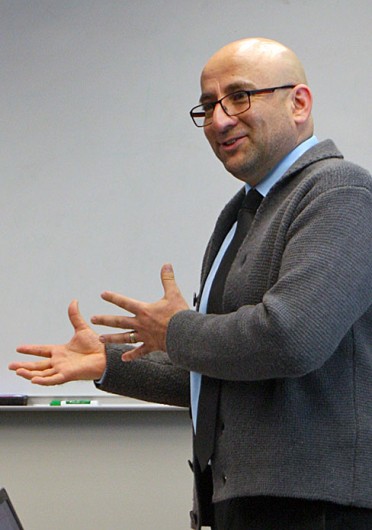
René Olate, an assistant professor at Ohio State’s College of Social Work, presents research on gang members and the high-risk youth in El Salvador Jan. 9 at the Journalism Building.
Credit: Shelby Lum / Photo editor
Pictures of bloodied bodies and gang tattoos filled the projector screen as Tupac Shakur’s song “Only God Can Judge Me” played in the background. René Olate, an assistant professor at Ohio State’s College of Social Work, moved to the next slide: a map of Central America. He explained how the most notorious gangs of the Latin American countries have ties that originated in Los Angeles.
“My dream of doing long term research with the same youths is impossible because so many are dead or in prison,” Olate said to a silent crowd of roughly 30 people.
Olate has been studying gang members and the high-risk youth in El Salvador since 2009. Thursday afternoon, he presented his research to students and faculty in the Journalism Building.
The focus of Olate’s research is intervention and prevention of gang violence and delinquency for the youth in an area known as the “Northern Triangle” of violence, which includes El Salvador, Honduras and Guatemala.
Olate was raised in a working class family in Chile in the 1980s. With his country under the rule of a military dictatorship, Olate was drawn toward social activism through his Catholic parish. In a 2012 interview with OSU Criminal Justice Research Center program director Amanda Kennedy, Olate said, “My decision to study social work was quite easy. I wanted to be a part of social change and fight against the forces that were oppressing my country.”
Kennedy told The Lantern she was looking forward to hearing about Olate’s new research.
“We’re really excited. He’s been with the department since 2011 but he just finished his last wave of research in 2013 so he hasn’t presented it to many people yet,” Kennedy said.
After Olate earned his master’s and Ph.D. in social work from Washington University of St. Louis, he began teaching at Boston College.
His experience studying and comparing Boston gangs with those of El Salvador brought him to the realization that youth violence and delinquency are not the real problem. Instead, he said, they are symptoms of poverty, as well as a number of complex environmental factors that vary in each city, locale and social community.
Olate said his main point is that the suppressive policies (called “mano dura,” which translates literally to “firm hand”) implemented by the government of El Salvador to stem gang violence have been a failure.
“Despite these policies, there are more youth gang members both in jails and on the streets than there were 10 years ago,” Olate said in his lecture. Later, he said young gang members in the region are hated by a majority of citizens because they are labeled as the problem behind violence, not as a product of it.
When talking about dead and incarcerated gang members, Olate said they often are no longer seen as victims.
“They become trophies. Trophies for the police, for the army and for rival gang cliques,” Olate said.
Olate said while gang culture will never be completely eliminated, he hopes his research will open the eyes of policy makers. He believes this could lead to a community effort of prevention and intervention that is better for the youth.
Tarkington Newman, a doctoral student at OSU working on a similar study of gangs and sports culture, said after the lecture he enjoyed Olate’s presentation.
“(I) would be interested in talking further with Dr. Olate about how one could possibly use sports programs to achieve the community intervention they both desire,” Newman said.
Olate told The Lantern in an interview after the speech that having access to a gang is a privilege.
“It is a chance to see the human side of these individuals, not just the violent side portrayed in the media,” Olate said.


